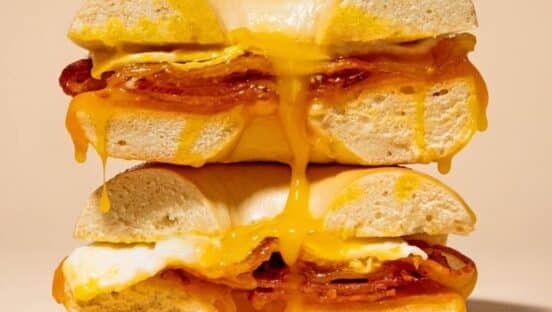The world of franchising is a complex process, yet brand after brand has made the plunge to accelerate growth and explore new markets. The International Franchise Association cites the number of franchise establishments will grow by 1.9 percent in 2023, or almost 15,000 units.
For young companies, the strategy might have been planned from the get-go, but what of legacy chains, that after decades in the business, have decided to finally add a franchise program to the menu?
H&H Bagels has been a beacon of breakfast in New York since the 1970s, using the same recipe and artisanal water bagel method for over 50 years. The well-known brand has been featured in media hits such as “Seinfeld,” “Sex and the City,” and “The Office.”
Recently, H&H Bagels released its franchise program, providing turnkey operations and support procedures on everything from site selection to customized technology systems.
Already, the company has inked expansion deals in Florida, California, and Virginia, to name a few. This is all part of an aggressive growth spurt unlike any other in H&H Bagels’ history.
“It wasn’t just an overnight decision,” CEO Jay Rushin says. “[Franchising] was always a long-term plan, but it took years of effort to get the brand to a place where we could expand nationwide.”
The chain streamlined its service model and franchise support systems before going public with the decision.
However, it did not take long for H&H Bagels to attract potential franchisees. According to Rushin, the labor model is attractive, with lower operating and rent costs. From the minute leases are signed, opening day is typically four to six months afterward, with assistance every step of the way.
“It’s a category which has been under-invested for years now,” Rushin says. “We think there’s a huge opportunity in the category itself … and it’s attracting new potential franchisees every day.”
These potential franchisees, Rushin says, are from a “wide spectrum,” including current and past operators of other brands or those who are new to franchising in general.
Restaurant franchising experience is a plus, but not mandatory with the right management team. If requirements are met, Rushin is open to those who “want to own and build something for themselves and their family.”
H&H Bagels is not the only legacy brand to reveal a franchise program during the pandemic. The Original Rainbow Cone, a Chicago staple, is headed in the same direction.
The company got its start in 1926 when “Grandpa Joe” Sapp combined slices of chocolate, strawberry, Palmer House (New York vanilla with cherries and walnuts), pistachio, and orange sherbet ice cream on one cone. Since then, Rainbow Cone has become a fundamental part of Chicagoland.
When Joe Buonavolanto III joined the Rainbow Cone team as vice president of franchise operations, his vision was to expand the ice cream shop into as many markets as possible in a tasteful manner.
He serves in the same role for The Buona Companies. Buona, another Chicagoan icon, is the original Italian beef restaurant with four decades of operation under its belt.
Buona’s partnership with Rainbow Cone allowed the shop to grow, such as an ice cream truck concept in 2020 that was “insane,” describes Buonavolanto. Its infrastructure helped Rainbow Cone begin the journey of franchising, which was always the vision.
“This really encouraged us to start franchising,” Buonavolanto says. “People were gravitating towards it in an exciting way … it [has always been] a very franchise-able model.”
He defines the product as “Instagrammable” and portable across major markets. This quality is attractive to future franchisees as “everybody eats ice cream,” says Buonavolanto.
From an economic standpoint, it has a substantial value proposition, with high margins and a proven model that’s lasted over 95 years. The technology stacks and menus have been optimized for success too.
Buonavolanto says the number one thing he searches for in a franchisee is passion. He’s not looking to sell a certain number of operators, but is instead looking for partnerships with dedicated people who have “an appetite for multi-unit development.”
There is an additional opportunity here for potential franchisees: Buona and Rainbow Cone have opened a dual-brand concept, which currently has six locations across the nation. The double drive-thru prototype comes with about 4,900 square feet and up to 40 menu items.
“We wanted to create two different experiences in one for the customer,” Buonavolanto says. “I would be lying if I said there wasn’t a huge financial gain by doing this.”
Sales jumped 20-30 percent at the Valparaiso, Indiana-based location. It earned an average daily revenue of $30,000 during the first two weeks of operation. For the dual concept, the target is to grow by around six units in the Nashville and Fort Lauderdale markets in the next four to five years.
Rainbow Cone’s franchise program is set to expand by more than 100 units in the next five years, in metro areas all over the U.S., including Texas, Florida, Arizona, and the Carolinas.
“The true value [of Rainbow Cone and Buona] is that it’s unique,” Buonavolanto adds. “By franchising the concept, we’re really going to make a bang … and [the units] are going to perform very nicely.”
He compares the success of the concepts to the Gold Rush—abundant opportunity and little competition.
“Our goal is to partner with good operators,” Buonavolanto says. “We’re going to partner with people who share our values.”


